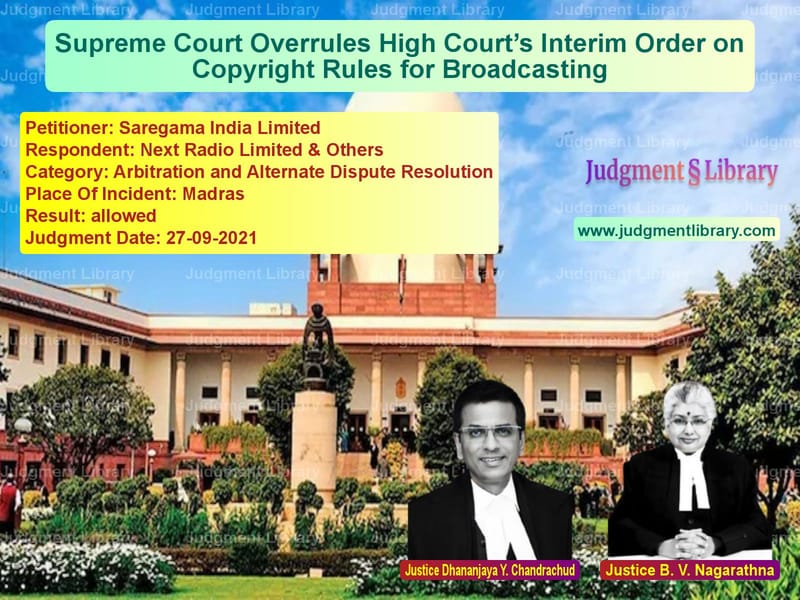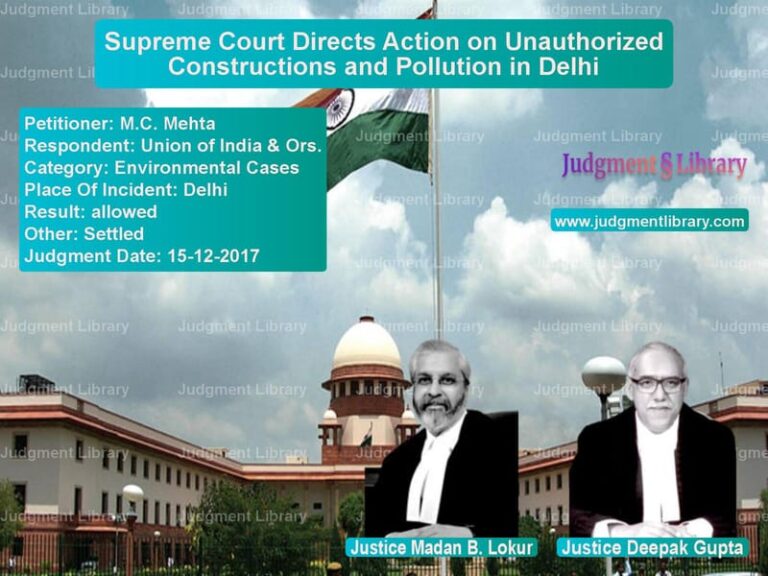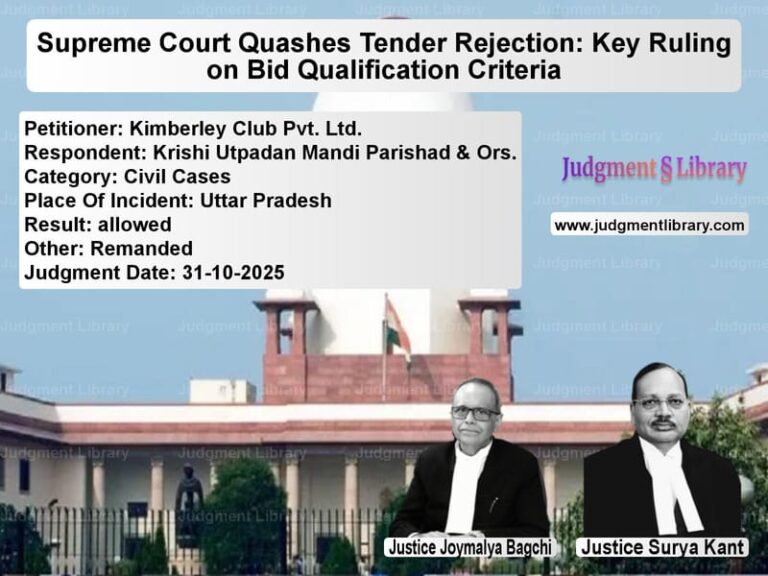Supreme Court Overrules High Court’s Interim Order on Copyright Rules for Broadcasting
The Supreme Court of India recently adjudicated a significant dispute regarding the broadcasting rights of copyrighted works under the Copyright Act, 1957. The case, involving Saregama India Limited as the appellant and Next Radio Limited and others as the respondents, revolved around the validity and implementation of Rule 29(4) of the Copyright Rules, 2013. The Supreme Court’s decision overturned an interim order issued by the Madras High Court, which had modified the statutory requirements for prior notice before broadcasting copyrighted works.
Background of the Case
The dispute arose from amendments made to the Copyright Act in 2012, introducing Section 31D, which allowed statutory licensing for broadcasting literary, musical works, and sound recordings. Rule 29(4) of the Copyright Rules, 2013, mandated that broadcasting organizations provide prior notice to copyright owners before using their works. However, a group of broadcasters, including Next Radio Limited, challenged this requirement, arguing that it imposed unreasonable restrictions on their operations.
The Madras High Court, in its interim order dated August 2, 2021, allowed broadcasters to furnish details of their broadcasts, including royalties payable, within 15 days after the broadcast, effectively substituting the statutory requirement of prior notice with post-facto compliance.
Arguments Presented
Appellant’s Arguments (Saregama India Limited)
- The High Court’s interim order effectively rewrote Rule 29(4), which was beyond the judiciary’s power, especially at the interlocutory stage.
- Section 31D of the Copyright Act explicitly requires prior notice, and Rule 29(4) was framed to ensure compliance.
- The rule-making authority, not the judiciary, has the prerogative to modify statutory provisions.
- The Intellectual Property Appellate Board (IPAB) had earlier determined royalty rates and compliance mechanisms, reinforcing the necessity of prior notice.
Respondent’s Arguments (Next Radio Limited & Others)
- Requiring prior notice under Rule 29(4) placed an undue burden on broadcasters, making live or spontaneous broadcasts practically impossible.
- The rule went beyond the mandate of Section 31D, which only required details such as duration and territorial coverage.
- Broadcasters were willing to pay royalties as determined by IPAB and provide records of usage, but prior notice was too restrictive.
- The Madras High Court’s modification of Rule 29(4) provided a more practical solution, allowing compliance without disrupting broadcasting operations.
Supreme Court’s Analysis and Judgment
The Supreme Court critically analyzed whether the High Court had the authority to alter Rule 29(4) and whether the statutory requirement of prior notice could be replaced with post-facto compliance.
On Judicial Overreach
“The judiciary cannot transgress into the domain of policy-making by re-writing a statute, however strong the temptations may be.”
The Court emphasized that courts must interpret laws, not rewrite them, particularly when statutory language is clear and unambiguous.
On the Necessity of Prior Notice
“Section 31D(2) speaks of the necessity of giving prior notice, in the manner as may be prescribed, of the intention to broadcast the work.”
The Supreme Court reaffirmed that prior notice was an essential statutory requirement and that modifying it through judicial intervention was impermissible.
On the Role of the High Court
“The High Court has substituted the provisions of Rule 29(4) with a regime of its own, which is beyond judicial authority.”
The Court held that by allowing ex-post facto reporting, the High Court effectively created a new rule, which was outside its jurisdiction.
Final Judgment
The Supreme Court allowed the appeals and set aside the High Court’s interim order, stating:
“We accordingly allow the appeals by setting aside the interim order of the High Court dated 2 August 2021. This is, however, subject to the clarification that this Court has not expressed any opinion on the merits of the rival submissions which would fall for determination in the exercise of the writ jurisdiction of the High Court in the pending proceedings.”
Implications of the Judgment
- Restores Statutory Authority: The decision reinforces the legislative intent behind Rule 29(4) and prevents judicial rewriting of laws.
- Protects Copyright Holders: Copyright owners retain their statutory right to prior notice before their works are broadcast.
- Limits Judicial Overreach: The ruling reaffirms that courts should not substitute statutory provisions with alternative frameworks.
- Clarifies Broadcasters’ Obligations: Broadcasters must comply with the statutory requirement of prior notice and cannot rely on post-facto compliance.
Conclusion
The Supreme Court’s ruling in this case underscores the judiciary’s role in upholding statutory provisions rather than modifying them. By setting aside the High Court’s interim order, the judgment reinforces the requirement for prior notice under Rule 29(4) and prevents judicial intervention from altering the legal framework established by Parliament.
Petitioner Name: Saregama India Limited.Respondent Name: Next Radio Limited & Others.Judgment By: Justice Dhananjaya Y. Chandrachud, Justice B. V. Nagarathna.Place Of Incident: Madras.Judgment Date: 27-09-2021.
Don’t miss out on the full details! Download the complete judgment in PDF format below and gain valuable insights instantly!
Download Judgment: saregama-india-limit-vs-next-radio-limited-&-supreme-court-of-india-judgment-dated-27-09-2021.pdf
Directly Download Judgment: Directly download this Judgment
See all petitions in Arbitration Act
See all petitions in Commercial Arbitration
See all petitions in Judgment by Dhananjaya Y Chandrachud
See all petitions in Judgment by B.V. Nagarathna
See all petitions in allowed
See all petitions in supreme court of India judgments September 2021
See all petitions in 2021 judgments
See all posts in Arbitration and Alternate Dispute Resolution Category
See all allowed petitions in Arbitration and Alternate Dispute Resolution Category
See all Dismissed petitions in Arbitration and Alternate Dispute Resolution Category
See all partially allowed petitions in Arbitration and Alternate Dispute Resolution Category







